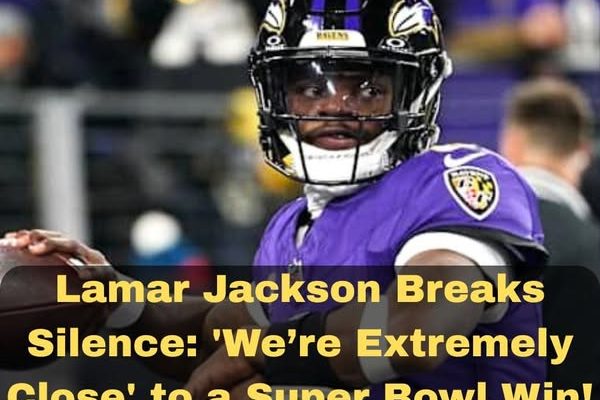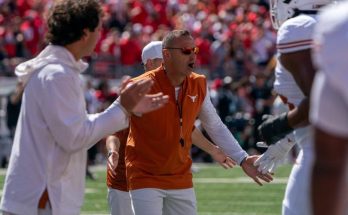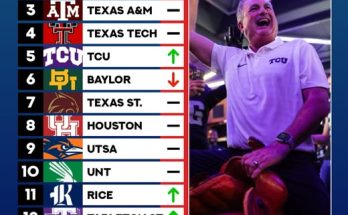Lamar Jackson is not your typical NFL quarterback. From the moment he was drafted with the 32nd overall pick in 2018, Jackson has been redefining what it means to lead a team from under center. His electric style, unmatched speed, and undeniable flair on the field have made him one of the league’s most captivating players. And despite playoff disappointments that critics continue to harp on, Jackson remains laser-focused on a singular mission: bringing a Super Bowl title back to Baltimore. His recent interview with comedian and media mogul Kevin Hart laid bare Jackson’s mindset. In the conversation, he didn’t mince words, confidently stating, “We’re extremely close.” Those aren’t just empty words—they’re the fuel powering one of the most compelling stories in football today.
To truly appreciate the magnitude of Jackson’s belief in his team and his journey, it’s important to examine both the highs and the lows of his career so far. Jackson burst onto the NFL scene late in his rookie year, replacing Joe Flacco as the starter and instantly giving the Ravens offense a jolt. His dynamic rushing ability and intuitive passing made Baltimore one of the most feared teams in the league almost overnight. In his first full season as a starter in 2019, Jackson won the MVP in spectacular fashion. He led the NFL in touchdown passes while simultaneously rushing for over 1,200 yards—a feat no quarterback in league history had accomplished. It wasn’t just that Jackson was good; he was revolutionizing the game.
But football isn’t played in a vacuum. Success in the regular season is one thing. The postseason is where legacies are made. And this is where Jackson’s critics love to focus their attention. After a dominant 14-2 season in 2019, the Ravens were stunned in the divisional round by the Tennessee Titans. Jackson put up impressive individual numbers in that game, but the offense as a whole failed to capitalize on key opportunities. In subsequent seasons, the Ravens have made playoff appearances, but each time, something has gone wrong. Injuries, execution, and elite opponents have all played a role. To Jackson’s detractors, these moments are proof that he isn’t “built for the playoffs.” But to Jackson himself—and to those who truly understand the nuances of team sport—they are simply growing pains.
The reality is that playoff football is often determined by the smallest margins. One tipped pass, one missed assignment, one injury can swing the tide of an entire game. And Jackson, more than most, has had to contend with factors outside his control. From a revolving door at wide receiver to injuries in the offensive line and backfield, Baltimore has faced significant hurdles each time they’ve made a postseason run. Yet despite this, Jackson has managed to keep the Ravens competitive, often single-handedly willing them into contention.
Leadership, in the context of professional sports, is about more than barking orders in the huddle. It’s about carrying the weight of expectations and responding with resolve when things don’t go as planned. This is where Jackson has grown the most. In the early days, he was viewed primarily as a playmaker—a sensational athlete who could make something out of nothing. But now, entering his seventh NFL season, Jackson is evolving into the type of leader every team dreams of. He’s vocal when needed, calm when the pressure rises, and relentless in his pursuit of excellence. His teammates gravitate toward him not just because of his talent, but because of his authenticity.
That authenticity was on full display in his conversation with Kevin Hart. Sitting across from a fellow cultural icon, Jackson wasn’t guarded or scripted. He spoke from the heart. And his message was clear: the Ravens aren’t far from the summit. They’ve tasted success, flirted with greatness, and come up short—but they’ve learned from every setback. Jackson’s statement, “We’re extremely close,” isn’t bravado. It’s the summation of years of progress, pain, and persistence. It’s the belief of a man who sees the full picture and knows that the journey isn’t over.
This level of conviction matters, especially in today’s NFL. The league is more competitive than ever, with a new generation of quarterbacks reshaping the landscape. Patrick Mahomes, Joe Burrow, Josh Allen, Jalen Hurts—these names dominate headlines and MVP ballots. But Jackson belongs in that conversation too, not just because of his resume, but because of his impact. His presence on the field forces defensive coordinators to rethink their entire approach. No other quarterback tilts the field quite like him. He can beat you with his legs, slice through you with his arm, and command attention on every snap.
Beyond the Xs and Os, Jackson’s journey is also one of cultural significance. As a Black quarterback who was doubted by scouts and analysts alike—many of whom suggested he should switch positions—Jackson has had to prove himself in ways that go beyond the field. His success is a testament to perseverance and self-belief. He refused to conform, refused to let the doubters dictate his path, and in doing so, he has inspired a new generation of athletes who see themselves in his story.
The betting markets have started to take notice. According to the latest odds from Las Vegas, the Ravens are among the top contenders to win the Super Bowl. This isn’t just lip service. Vegas oddsmakers analyze every facet of a team—from roster depth to coaching philosophy—and the Ravens check nearly every box. Their defense is formidable, their running game is potent, and in Jackson, they have a quarterback capable of taking over any game. The pieces are in place. What remains is execution.
A deep playoff run requires more than talent—it requires timing, health, and sometimes, a little bit of luck. The Ravens understand this. Their front office, led by General Manager Eric DeCosta, has made savvy moves to surround Jackson with the tools he needs. The addition of playmakers at wide receiver, the continued development of a young offensive line, and the hiring of offensive coordinator Todd Monken have all been steps in the right direction. Monken’s offense is designed to maximize Jackson’s strengths, emphasizing tempo, misdirection, and vertical threats. Early returns from this partnership suggest that Jackson is more comfortable and confident than ever before.
What’s even more compelling is the way Jackson has handled the spotlight. Fame, especially in the age of social media, can be overwhelming. Every throw, every misstep, every decision is dissected. But Jackson rarely lashes out. He lets his play do the talking. When asked tough questions, he responds with grace. When facing adversity, he embraces it. That’s maturity. That’s growth. And that’s the kind of leadership that wins championships.
It’s also worth noting how Jackson’s relationship with the city of Baltimore has deepened over time. In a town that reveres toughness and blue-collar grit, Jackson is a perfect fit. He plays with heart. He competes every down. And he genuinely cares. During contract negotiations—which were highly public and, at times, contentious—Jackson never threw his teammates under the bus. He never distanced himself from the organization. When he finally signed a long-term deal making him one of the highest-paid players in NFL history, it wasn’t just a business move. It was a commitment to the team and the city that believed in him.
This is where the narrative begins to shift. For years, Jackson was seen as a phenomenon—unpredictable, dazzling, but somehow incomplete. Now, he’s stepping into the phase of his career where he can redefine how quarterbacks are measured. It’s no longer just about statistics or style; it’s about legacy. And legacy is built in January and February. Jackson knows this. That’s why his message to Hart carried so much weight. “We’re extremely close” isn’t just a rallying cry for fans—it’s a personal vow.
When you consider the trajectory of past MVP quarterbacks, you start to see a pattern. Many of them, including Peyton Manning and Drew Brees, faced repeated playoff failures before finally breaking through. Even Mahomes, for all his success, had to endure a heartbreaking AFC Championship loss before hoisting the Lombardi Trophy. Jackson is walking that same path. Every setback sharpens his resolve. Every doubt becomes fuel.
In many ways, Jackson’s story is emblematic of the Ravens as a whole. The franchise, since its inception in 1996, has always prided itself on toughness, discipline, and resilience. From Ray Lewis to Ed Reed to Terrell Suggs, Baltimore has been home to some of the fiercest competitors in NFL history. Jackson represents the next chapter in that legacy. He brings a new style, a new swagger, but the same hunger.
And that hunger is palpable. Spend five minutes listening to Jackson speak, and you’ll feel it. He isn’t satisfied with accolades. He doesn’t care about highlight reels or endorsement deals. He wants rings. He wants respect. He wants to be remembered not just as one of the most exciting players of his generation, but as one of the greatest. That kind of ambition doesn’t come easy. It requires sacrifice, discipline, and unshakable belief.
Critics will continue to point to the past. They’ll say Jackson can’t win in the playoffs. They’ll say his style won’t last. But they’ve been saying those things for years, and Jackson just keeps proving them wrong. With each passing season, he grows wiser. With each game, he becomes more complete. The Ravens, under his leadership, are not a team to be taken lightly.
As the 2025 NFL season approaches, the stage is set. The roster is deep. The playbook is loaded. The belief is strong. And most importantly, the quarterback is ready. Not just physically, but mentally and emotionally. He’s been through the fire, and he’s still standing. Stronger. Smarter. Hungrier.
Lamar Jackson isn’t just chasing a Super Bowl. He’s chasing greatness. And if you ask him, he’ll tell you straight: they’re extremely close. That kind of confidence isn’t born overnight. It comes from years of grind, growth, and grit. And if history has taught us anything, it’s this—never bet against Lamar Jackson when he sets his sights on something. Because when he says it, he means it. And when he means it, he usually finds a way to make it happen.



